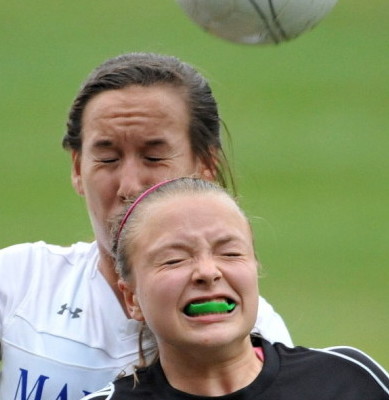Researchers, doctors and athletic trainers are always searching for ways to prevent concussions. Part of that requires having a better idea of the risks athletes face.
But parents can put athletes at greater risk for other health problems by taking drastic actions to protect their children.
“My biggest worry with concussions right now is the fact that we are terrifying parents about playing sports, whether it be soccer, football, rugby, lacrosse, hockey, basketball, you name it. We’re terrifying our parents and they’re making decisions about activities, and that’s the worst thing we can do,” said Dr. Paul Berkner, director of the Maine Concussion Management Initiative at Colby College.
“We have a population of young adults who don’t do anything near as much. Our obesity rate in children in Maine is terrible. If we start having people not participating, I think the long-term risks from obesity are probably higher than the long-term risks from concussions,” Berkner said.
Athletes can take steps to reduce their risk of concussions, experts say. Some are quite basic.
“Being in good overall physical condition is very, very important,” said Dr. Chris Lutrzykowski, a specialist with Maine General Health.
Much like tackling in football, experts are still debating banning or placing age restrictions on heading in soccer. Some suggest simply enforcing the rules will reduce aggressive body contact and reduce concussions, while others believe that even repetitive head-to-ball contact in younger children can cause brain trauma.
More and more soccer players are now wearing headgear for protection. The equipment, which can cost anywhere between $20-$80, can prevent external head injuries such as cuts and bruises, but experts say they don’t have a clinical link to reducing concussions.
“There is no data that supports the use of headgear makes a difference whatsoever,” Berkner said. “In football, helmets are designed to reduce skull fractures, not to reduce concussions.”
Lutrzykowski said some studies have shown improved neck strength can reduce the risk of soccer concussions. Stronger necks can reduce the whiplash effect that can cause or exacerbate a concussion.
With that in mind, Colby College head athletic trainer Tim Weston said his athletes are incorporating more exercises to strengthen their necks and trapezius muscles into their conditioning programs.
Contact from heading the ball is the biggest risk factor, although head-to-head or head-to-body contact poses a far greater risk than head-to-ball contact.
“I think it’s critical to have that neck and upper-body strength, particularly in soccer,” he said.
Send questions/comments to the editors.



Success. Please wait for the page to reload. If the page does not reload within 5 seconds, please refresh the page.
Enter your email and password to access comments.
Hi, to comment on stories you must . This profile is in addition to your subscription and website login.
Already have a commenting profile? .
Invalid username/password.
Please check your email to confirm and complete your registration.
Only subscribers are eligible to post comments. Please subscribe or login first for digital access. Here’s why.
Use the form below to reset your password. When you've submitted your account email, we will send an email with a reset code.